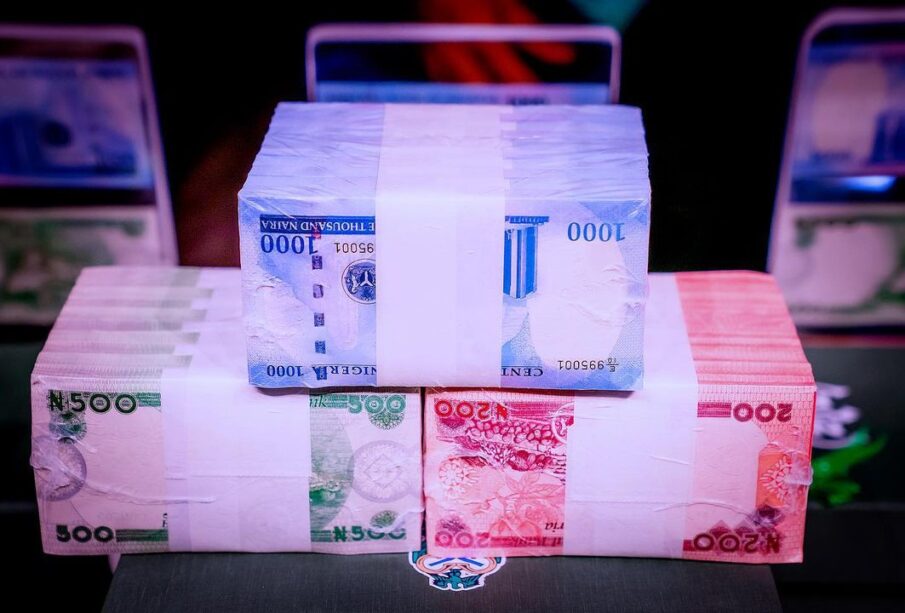
Naira notes
The Central Bank of Nigeria may bow to mounting pressure and contract the printing of the redesigned N1,000, N500 and N200 notes to foreign contractors in the coming days in order to boost the circulation of the currency.
It was gathered that this had become imperative as sources said the Nigerian Security Printing and Minting Plc, which had been responsible for the printing of the naira, appeared to lack the capacity to meet the demand for the new notes.
This is as the National Council of State advised the apex bank to print more naira notes or re-circulate the old notes, which it had mopped up from circulation, in order to ease the pressure on hapless Nigerians, who had been suffering from the scarcity of the new notes.
A top banker told The Punch on Friday that information available to him indicated that the Mint had succeeded in printing N500bn worth of the new N1,000, N500 and N200 notes and might not have the capacity to do more than that at the moment.
The top banker, who spoke on condition of anonymity because of the sensitive nature of the subject and because he had not been authorised to speak officially on it, said, “It is obvious that what has been printed is not enough. How can you withdraw about N2.1tn from circulation and only print N500bn to replace that?
“Is it not obvious that the NSPMC does not have the capacity to print more than N500bn? With the Mint’s current capacity, to print N2tn will take about a year. Even the N500bn printed has been hijacked by politicians, especially governors. You heard one governor saying one of his colleagues was able to withdraw N500m.
“What the CBN is doing is to give us only 10 per cent of the worth of the old notes we deposit with it. For instance, if a bank takes N1bn to the CBN branch office in its area of operation, it will be given N100m new notes to distribute to its branches nationwide and load onto its ATMs.”
A former top official of the CBN, who spoke to The Punch anonymously, echoed a similar sentiment that the Mint might not have the capacity to print more naira notes and that could be responsible for the scarcity of the notes.
The ex-CBN official said, “I think it is a matter of capacity on the part of the Mint. The NSPMC has been solely responsible for the printing of the local currency and its role wasn’t an issue before now because it periodically printed notes, which the CBN released into the system along with those already in circulation. Only mutilated notes were withdrawn by the apex bank and destroyed.
“As it is now, the CBN may have little or no choice but to contract the printing of the new N1,000, N500 and N200 notes to foreign contractors in order to make the new notes go round the country quickly and save the nation the embarrassment caused by the current scarcity and its attendant consequences.”
Efforts to get a response from the CBN through its Director of Corporate Communications, Osita Nwanisobi, were futile as calls made to his mobile telephone did not connect, while he had yet to respond to WhatsApp messages sent to him.
However, an official of the CBN, who pleaded that his identity should be concealed, said there was no problem with the supply of the new notes by the NSPMC, adding that it was a deliberate policy to print limited amounts in order to encourage Nigerians to embrace other means of transaction other than cash.
“We don’t have an issue with what the Mint is doing regarding the printing of the new naira notes. There is no problem with the mint’s capacity. The fund it has expended so far on the printing of the new N1,000, N500 and N200 notes is its budget for the fourth quarter of last year.”
When a telephone number listed on the website of the NSPMC was called on Friday, it rang out. A message sent to the same number had not been replied as of the time of filing this report.
The NSPMC stated on its website, “The MINT has been in charge of the production of local currency notes since they were introduced in 1965. It does this on behalf of the Central Bank of Nigeria.
“For decades, the MINT has produced Nigeria’s naira notes. The notes are among the most secure in the world, with features that are almost impossible to replicate outside of our production systems.”
The CBN had stated in December that it spent over N800bn between 2017 and 2021 to maintain the naira. The apex bank’s Deputy Governor, Financial System Stability, Aisha Ahmad, who appeared before the House of Representatives, added that the amount had spiked by N10bn annually and attributed over 90 per cent of the currency management cost to the production of naira notes.
Meanwhile, the National Council of State on Friday in Abuja advised President Muhammadu Buhari and the Governor of the CBN, Godwin Emefiele, to either intensify the printing of new naira notes or re-circulate the old ones to ease the hardship being faced by Nigerians.
The country’s highest advisory organ also insisted that the general elections should hold as scheduled based on the readiness of the Independent National Electoral Commission and the Nigeria Police Force.











